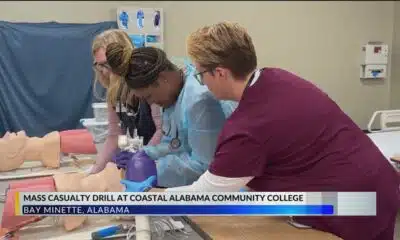Mississippi News
House, Senate take different paths on spending federal funds
House, Senate take different paths on spending historic federal funds
Mississippi House members are developing a framework of how they want to spend $1.8 billion in federal COVID-19 relief funds, but seem content on waiting until the end of the session to reveal specifics.
Senate leaders, on the other hand, have released their plans on how to spend the American Rescue Plan funds and have begun passing them.
The dueling strategies will almost certainly lead to end-of-session negotiations between a handful of leaders from both chambers, and it will likely be weeks before Mississippians learn how lawmakers will decide to spend the historic amount of federal funds.
The House is passing bills, but for the most part they are not placing the exact amount of funds in the bill. House Pro Tem Jason White, R-West, said those exact amounts will be worked out in conference between House and Senate leaders at the end of the session.
On Tuesday, the Senate passed its largest ARPA bill — a measure to use $750 million of the money to create a state match for city, county and rural water association infrastructure projects. The state would match local governments’ spending of the ARPA funds they are receiving directly from the federal government. Federal law allows the ARPA funds to be used for local governments’ water and sewerage infrastructure.
Senate Bill 2822 would provide a dollar-for-dollar match to counties and large cities for qualified water, sewerage and stormwater projects. For smaller cities that are receiving less than $1 million in direct ARPA money, the state would match qualified projects $2 to $1. For rural water associations with 250 or more customers, the program would provide grants of up to $2.5 million for qualified projects.
READ MORE: Senate unveils plan for spending $1.8 billion in federal pandemic stimulus
Sen. John Polk, chair of the Senate subcommittee handling ARPA spending, said the Mississippi Department of Environmental Quality, with help from the Department of Health, would vet and approve applications for projects, based on a grading scale. Polk said this grade would include whether a system is under federal orders to improve or having problems such as high lead levels, and it would give greater weight to projects “ready to go within six months.”
Sen. Derrick Simmons, D-Greenville, said the state fund should focus first on water and sewer systems in the worst shape, and in communities that can least afford upgrades. Sen. John Horhn, D-Jackson, said those under federal orders to upgrade should get top priority.
Polk said the grading system — and $2-to-$1 match for smaller cities — would address those issues to some extent but, “We have to keep it fair for everyone. Every area has needs.”
Sen. David Blount, D-Jackson, said, “I think this bill, along with the appropriations bill to follow, is the most important thing we will pass this session. We need to look at this as one-time money that we will probably never see again.”
Blount asked Polk whether the proposed ARPA spending would be enough to fix water and sewerage problems and needs in Mississippi.
“I do not,” Polk said. “I know, for instance, the rural water associations told us they would need about $700 million to cover all they need.” But, Polk said, “I’m not convinced that this is a state problem” and that local governments should do a better job of keeping up water and sewerage infrastructure.
The Senate passed on to the House several other ARPA spending bills on Tuesday, including a measure that would provide up to $10 million for infrastructure projects at private colleges, one that would provide death benefits for first responders who die from COVID-19. The chamber also passed Senate Bill 2721, an ARPA workforce bill that would provide training, loan repayment and enhanced pay for nurses and other health workers.
In the House, White said the focus of the spending of the federal funds should be on helping local governments with their water and sewer needs and helping health care entities that have been impacted by the COVID-19 pandemic.
“There is a pandemic. We have the money because of the pandemic, so we ought to spend at least some it to help with the pandemic,” he said.
White said he does not know of an area where the one-time funds can have more of an impact than on local water and sewer needs. He said he envisions $400 million to $600 million being put in that area in the first year. White also said he does not necessarily believe all of the funds should be spent during the 2022 session.
Legislation that has passed the House:
- Would create a funds to help rural water associations with their infrastructure. It would require no matching funds.
- Would create a program to help municipalities and counties with their water and wastewater infrastructure, requiring a 20% match from the local governments.
- Would create a funds to deposit funds to aid the city of Jackson with its water and wastewater infrastructure. The city, to receive the funds, would have to commit to providing regular reports to the state on how the money was being spent.
The outdated Jackson water system is under scrutiny from federal officials who have expressed concern about the quality of the city’s water. Plus, the system routinely breaks down during extreme cold weather.
Rep. Chris Bell, D-Jackson, said negotiations are ongoing on the amount of state support the city will receive. But he said communications between city officials and legislative leaders in determining the amount of help the city will get are currently positive.
“Absolutely, they are good,” he said.
The House has also passed legislation that would provide local law enforcement and firefighters (including volunteers) $1,000 in premium pay for their efforts during the pandemic. And hospitals could receive grants of up to $250,000 to help with treatment of coronavirus patients. Those funds could be used to help pay their health care staff.
Plus, a program would be established under legislation that has passed the House to develop a plan to expand nursing programs at community colleges. The Senate is proposing similar spending for nursing programs.
FOLLOW THE MONEY: Tracking Mississippi’s historic influx of federal cash
This article first appeared on Mississippi Today and is republished here under a Creative Commons license.
Mississippi News
Suspect in Charlie Kirk killing is charged with murder as prosecutor says DNA found on rifle trigger
SUMMARY: Tyler Robinson, 22, was charged with the murder of conservative figure Charlie Kirk, shot Sept. 10 at Utah Valley University. Robinson confessed via text to his partner and left a note expressing intent to kill Kirk, citing hatred. DNA linked Robinson to the rifle used. Prosecutors revealed Robinson planned the attack for over a week and targeted Kirk, a key conservative youth leader. Robinson’s political views shifted after dating a transgender man, causing family tensions. After the shooting, Robinson discarded evidence and urged his partner to delete texts. FBI investigates possible wider connections. Charges include murder with potential death penalty enhancements.
Read the full article
The post Suspect in Charlie Kirk killing is charged with murder as prosecutor says DNA found on rifle trigger appeared first on www.wjtv.com
Mississippi News
Suspect in Charlie Kirk assassination believed to have acted alone, says Utah governor
SUMMARY: Tyler Robinson, 22, was arrested for the targeted assassination of conservative activist Charlie Kirk in Orem, Utah. Authorities said Robinson had expressed opposition to Kirk’s views and indicated responsibility after the shooting. The attack occurred during a Turning Point USA event at Utah Valley University, where Kirk was shot once from a rooftop and later died in hospital. Engravings on bullets and chat messages helped link Robinson to the crime, which was captured on grim video. The killing sparked bipartisan condemnation amid rising political violence. President Trump announced Robinson’s arrest and plans to award Kirk the Presidential Medal of Freedom.
The post Suspect in Charlie Kirk assassination believed to have acted alone, says Utah governor appeared first on www.wjtv.com
Mississippi News
Americans mark the 24th anniversary of the 9/11 attacks with emotional ceremonies
SUMMARY: On the 24th anniversary of the 9/11 attacks, solemn ceremonies were held in New York, at the Pentagon, and in Shanksville to honor nearly 3,000 victims. Families shared personal remembrances, emphasizing ongoing grief and the importance of remembrance. Vice President JD Vance postponed his attendance to visit a recently assassinated activist’s family, adding tension to the day. President Trump spoke at the Pentagon, pledging never to forget and awarding the Presidential Medal of Freedom posthumously. The attacks’ global impact reshaped U.S. policy, leading to wars and extensive health care costs for victims. Efforts continue to finalize legal proceedings against the alleged plot mastermind.
The post Americans mark the 24th anniversary of the 9/11 attacks with emotional ceremonies appeared first on www.wcbi.com
-
News from the South - North Carolina News Feed6 days ago
What we know about Charlie Kirk shooting suspect, how he was caught
-
News from the South - North Carolina News Feed7 days ago
Federal hate crime charge sought in Charlotte stabbing | North Carolina
-
Our Mississippi Home5 days ago
Screech Owls – Small but Cute
-
News from the South - Arkansas News Feed6 days ago
NW Arkansas Championship expected to bring money to Rogers
-
News from the South - North Carolina News Feed7 days ago
Under pressure, some immigrants are leaving American dreams behind
-
Mississippi News Video7 days ago
Mississippi Science Fest showcases STEAM events, activities
-
News from the South - Florida News Feed7 days ago
CBS Miami highlights free mammogram program with mobile mammovan
-
News from the South - Texas News Feed7 days ago
Safe Central Texas meet-up spots for online purchases



















































